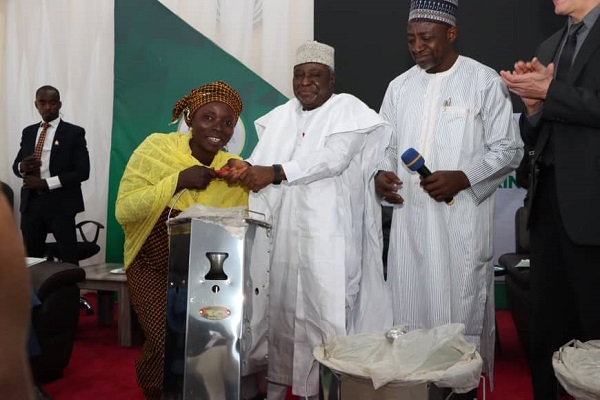
As part of its plan to save the environment from continuous degradation, unabated deforestation and reduce harmful emissions in the country, the National Agency for Science and Engineering Infrastructure (NASENI) in collaboration with Atmosfair, Germany, today launched and distributed 3,000 units of the NASENI-Atmosfair ‘Save 80’ energy-efficient stove to widows, IDPs and other indigent women across the six geo-political zones.
Speaking at the unveiling and distribution of the stoves at the NASENI headquarters in Abuja, the executive vice-chairman/chief executive of NASENI, Engr. Prof. Mohammed Sani Haruna said with the consideration of Nigeria’s Nationally Determined Contributions (NDCs) targets for emission reduction by 2030, the use of energy-efficient cooking stoves provides high potential for emission reduction and mitigating climate change.
According to Haruna, the stove is more energy-efficient, saves over 40 per cent of cooking time and is more environmentally friendly compared to firewood and charcoal.
He said with the launch of the ‘Save 80’ energy-efficient cooking stove, Nigeria will achieve the United Nation’s Sustainable Development Goal No.7 on Energy access to affordable, reliable, sustainable and Clean Energy for All.
“NASENI, in collaboration with Atmosfair, launch the energy efficient stove today and will distribute 3000 units as a donation to deserving women, IDPs and widows across the six geo-political zones. This corporate social responsibility (CSR) will improve the agency’s eco-friendliness and carbon footprint, a positive contribution to climate change and service to humanity,” he stated.
Haruna noted that the agency has intervened in several sectors of the Nigerian economy and has domesticated several technologies which beforehand were considered impossible in the country, adding that, hitherto, NASENI made several efforts in renewable energy technologies, including biomass, wind energy and solar module manufacturing plant at Karshi, Abuja.
“Our progress in the production of solar cells locally will drastically reduce the per megawatt cost of clean electricity and make solar electricity available at a more affordable rate to the average citizen. The local solar cells development will promote affordability of solar energy as the prices will crash and increase the proportion of solar electricity in our energy mix,” he said.
Haruna said the stove will be handed over to the Ministry of Humanitarian Affairs, Disaster Management and Social Development for onward distribution to IDPs and those affected by recent flooding in the country.
“Let me add that the production of these stoves is also a viable, self-sustaining and revenue-generating venture which will create thousands of employment opportunities. We are duplicating the manufacturing facility for both the stove and the briquettes (fuel stove) which is from agricultural waste. The product will be manufactured simultaneously in Kano and Agada villages of Karu local government area of Nasarawa State,” he affirmed.
A statement by NASENI’s deputy director, information, Mr. Olusegun Ayeoyenikan said the managing director, Atmosfair, Germany, Dr. Dietrich Brockhagen called Nigeria’s NDCs to the Paris Agreement sets to ensure that 7.3 million efficient cooking stoves are used across all Nigerian household by 2030 “an ambitious one”.
He said: “[These stoves] save 80 per cent fuel wood. More so, they come with a ‘wonder box’ (a heat-containing device). The efficiency can go up to 90 per cent and, together with NASENI, we want to go all the way to 100 per cent fuel wood saving.”


